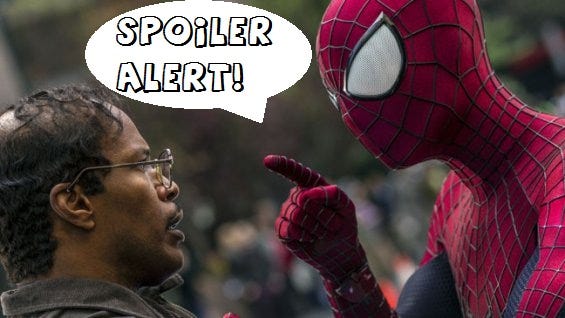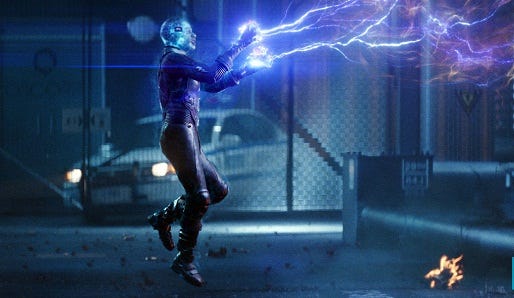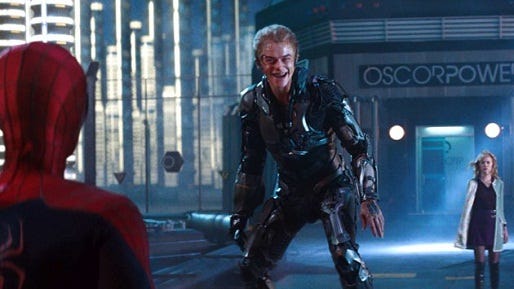Yap vs. Yap: The Amazing Spider-Man 2
Hello again, True Believers! "The Amazing Spider-Man 2" is out in theaters now, and the time for hype is past and it's time to get down to it! Marc Webb's second Spider-Man adventure has been, like the first, full of controversy within the movie and comic book communities. Many fans bemoaned the reboot concept and have hefted heaping helpings of hatred upon both films. Yappers Joe Shearer and Evan Dossey have both seen "The Amazing Spider-Man 2," and both consider themselves (in some form or fashion) comic book aficionados. They also have somewhat divergent opinions of the movie. So, who is right? Let's let you decide.
Oh, and just a warning: Evan and Joe will be discussing very spoilery plot points freely, so if you haven't seen the movie and don't want it spoiled, do not read further!

Joe: I'm on record: "The Amazing Spider-Man 2" is the best of the Spider-Man films. Spider-Man was my holy grail movie character my entire life, and as it turns out, "TASM2" is one of the two Spider-Man stories I've wanted to see in film form my entire life (more on this later). Andrew Garfield is a superior Spider-Man to Tobey Maguire, Emma Stone out-damsels Kirsten Dunst by a country mile, the characters are more complex, the stories are more intricate, and they are in almost every way more satisfying. "The Amazing Spider-Man 2" is not a perfect film by any stretch of the imagination, but it absolutely nails what Spider-Man is about. It's an emotional roller coaster that veers from rank silliness to outright hokiness to the height of emotional resonance, and I bought into it completely.
Evan: I think the central weakness of the film, for me, was the schizophrenic nature of the script. While it does have moments of amazing silliness that I adored, those moments didn't mesh well with the ongoing CW-level drama between Gwen and Peter. In addition, the drama between Gwen and Peter felt very forced to me. Instead of moving forward from their status quo at the end of the first film, they kick the can around the road until the conclusion of the film. As we know, at that point, it's too late.
The worst thing about the film for me, though, was that as a result of their mishandling the Gwen & Peter relationship, the very story you're referring to is sort of diminished. Let's come out with it: Gwen Stacy, the first great love of Peter Parker's life, meets her untimely end at the hands of the Green Goblin at the climax of "The Amazing Spider-Man 2." And their handling of that situation is the quintessential example of what this movie does wrong in terms of unearned emotional moments and lackadaisical structuring.
Joe: I'm interested in knowing what you thought didn't work about the romance. To me, that was the film's biggest success. Garfield and Stone have tremendous chemistry, and while the story deviates from the comics narrative somewhat (in the comics, Captain Stacy actually told Peter to take care of Gwen, not stay away from her), I feel like the spirit is alive and well. Peter's ongoing guilt about Captain Stacy was a fantastic addition, and I'm glad they interspersed those images of him in there, though I still wish they'd killed him in this movie, then Gwen in the next to build those relationships and add weight to them.
If anything, I felt like their relationship was more real than most movie romances (and certainly moreso than the Raimi movies, where their relationship was very straightforward will-they-or-won't-they). Here, Peter has that uncertainty and guilt. While I could have watched a movie whose sole main thrust was this story, I had no problems (as someone who has waited more than 20 years to see it, mind you) with the execution. The emotional impact was the same for me.
Regarding the script, I agree it bounces around a lot. There are a lot of threads going at the same time, but in a lot of ways that worked for me too. Raimi's "Spider-Man 2" was about how life as Spider-Man is topsy-turvy and chaotic; this one conveyed the same thing on a larger level. Spider-Man had to deal with all of these extreme dangers out of nowhere, with no seeming rhyme or reason: he has to take care of Aunt May and keep her happy; he's trying to graduate high school; he deals with a psychotic Russian gangster who is trying to steal plutonium; he has to maintain a relationship with Gwen; he has to hide who he is; and he has to deal with an out-of-control live wire. Oh, and he has to be there for an old friend he hasn't seen in years...and continue to explore the backstory of his parents. That veering in tone and shift is, in some ways, a better way to tell the story than a hindrance to the movie. Some of the execution is certainly up and down, but that is life as Spider-Man in a nutshell.
Evan: It's funny you bring up "Spider-Man 2" because, in many ways, this is the other side of the coin. In the same way "Spider-Man 2" perfected all the good elements of Spider-Man, "The Amazing Spider-Man 2" doubles down on what I didn't think worked in its predecessor. I didn't like "The Amazing Spider-Man all that much for several reasons. Most notably, I think the Webb films have difficulty balancing the disaster that is Peter Parker's life with the hope that his life as Spider-Man provides him and other people. While they were definitely trying in this film, that story got lost in a script that was too unwieldy to focus on any one story. Electro's story — of a Spider-Fan gone bad — worked for me at first, but then became less and less interesting the more unlikable Max Dillon got. Harry Osborn returning was great, but his eventual turn felt sudden and undeserved. The moment with Spidey saving the kid, though, was phenomenal — the best "Spidey inspires" among all five movies.
What I didn't like about the Peter / Gwen relationship was largely due to the end of the movie. The death of Gwen Stacy is such a monumental moment in the life of Peter Parker that to set it up with a movie about them constantly ping-ponging, never really together, after another movie where they were never really *together*....it felt rank to me. You mention that you wish there had been more setup with Captain Stacy, and so do I. I wish there had been more time paid to any of these characters.
To me, introducing Gwen Stacy as the main love interest gave Webb & Co. a very, very clear license to tell a classic story correctly. I guess a major problem to them, though, is that Raimi already told that story perfectly, sans M.J. dying on the bridge. Their solution —to make a movie about something else and then throw in a Green Goblin to do her in within the last 15 minutes, and convey Peter's mourning in a minute montage — did not do justice to a story that, ultimately, is really about Peter not killing the Green Goblin in retaliation. We didn't even see what he did to Harry after Gwen fell. It felt to me like an afterthought.
Joe: I agree with your criticism of that one minute of screen time where months passed in the movie. It lessened the impact of her death, but her death did resonate in the last scene. You could tell in the final scene between the kid and Rhino. It felt like almost a chore to be Spider-Man at that moment, and it's a testament to Garfield's acting that you could see it in his body language as he stood on the police car, with his shoulders just slightly slouched. I didn't like the moment with the kid, and some of my problems with the movie do stem from moments like that — where people stand around New York City watching as if they're in an arena while someone is firing a machine gun all over the place.

I went the opposite from you on most of the rest of the points you made: I thought Max Dillon pre-Electro was almost a character from "Batman and Robin," with the over-the-top birthday cake scene, his self-conscious combover and his total absorption with being the person no one noticed. But once he became Electro, I could ignore that and let him be the bad guy. I didn't care why he was being Electro, and that's part of the point in this movie: It's not a story about Spider-Man vs. Bad Guy X, Y and Z. In a sense, it's about Spider-Man vs. the world, which dumps on him every chance it gets despite his best efforts to try to save everyone and everything. That's the curse Maguire's Parker talked about in the first Raimi Spider-Man, but that struggle feels more real in these films.
I'll give you that Harry's story was truncated a little, but again I didn't have a problem with it. I think Peter outright refusing to help him — essentially telling him he won't lift a finger to save his life — is enough motivation for him to turn on Peter, especially since they hadn't been friends really for years.
Regarding Gwen's death and the aftermath, I feel like we will get proper resolution to that story in the next sequel. As much as I wanted to see that fight, as you said: Raimi already gave it to us sans the Gwen / MJ death (which, retroactively, has become a medium-sized gripe for me for the Raimi movies), and I felt like for this Peter, his reaction was more true to the character. Her death didn't spark a fire in him. It shut him down. I like to think it was the police who actually took in Harry, and Spider-Man wasn't involved in his apprehension past that point. That will allow, over time, the chance for that rage to build so we can have the proper resolution to that arc, since that's really what this whole movie series is about — Peter taking down Oscorp, a massive, powerful corporation that has, in many ways, ruined his life.
Evan: See, my problem with Gwen's death stems from the fact that such a monumental moment is given little screen time, and then that moment with the kid happens...and we know Peter's back to using Spider-Man to escape from his problems. I don't think that Spider-Man is supposed to be any less joyful in that moment, that he's slumped; I think we're supposed to read that moment as a very straightforward "Peter still has hope because that is what he inspires in others" moment.

It's wrong and ridiculous to rely on another movie to provide "proper resolution" to such a massive moment. It's shitty storytelling, straight-up. My main problem with the first movie is that it managed to capture the tragedy of being Peter Parker without, I think, sufficiently capturing the light of being Peter Parker, being Spider-Man. This continued to be the case in "The Amazing Spider-Man 2." It's a world of hurt being piled on Spider-Man without, as of the end of the second film, any clarity on a character level as to why Peter Parker would want to continue being Spider-Man so suddenly. They needed a montage to get to where they want to be for the spin-offs, but if they were really committing to "TASM3" being a conclusion to the arc, they would have ended "TASM2" with the uniform in a dumpster.
"Peter vs. Oscorp" is, ultimately, another minor gripe I have with the film. Oscorp as a villain factory is interesting, but, it's also meaningless. Norman Osborn, without the Gwen moment, is a useless and meaningless villain. Harry, without his father problems and troubled mind, is completely and utterly bland. Having Harry kill Gwen out of nowhere ruins both the conflict his character had choosing between good and evil and the potential for Norman to ever be anything more than another green punching bag for Peter.
For me, "The Amazing Spider-Man 2" was easily one of the most visually wonderful Spider-Man films. I appreciated it, and, honestly, mentally ranked it right up there with "Spider-Man 2" for most of the film. But the short-sighted way they ended the Gwen Stacy storyline has left me unsure I'll bother seeing "The Amazing Spider-Man 3" in theaters.
Why bother seeing a cash-in when I can just see Marvel Studios movies twice a year?


